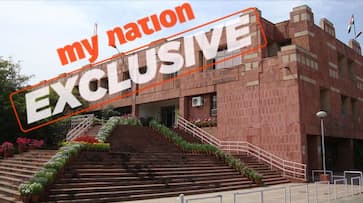The successful candidates of the Left Unity have failed to submit legitimate bills of their campaign expenditure, as mandated by the Lyngdoh Committee. Instead of following the law, they have approached the Delhi high court.
New Delhi: The reigning students' union of the Jawaharlal Nehru University (JNU) that came to power in the Left's last student bastion in north India is liable to be dissolved. In the 2018 students body elections Left Unity candidates did not follow standards set by the Supreme Court-endorsed Lyngdoh Committee Report and also allegedly submitted fake bills of expenditure incurred during the poll campaign.
Now they are crying foul, trying to hide behind allegations of political vendetta on the part of the JNU administration.
The JNU polls were swept by a Left alliance, called Left Unity, comprising AISA, SFI, AISF and DSF, but the students’ union moved Delhi high court, claiming that the varsity administration had refused to recognise the body and had not notified the results even when the results had been declared on 16 September 2018.
Also read: RSS storms red bastion JNU with Ram Mandir Yatra, leaves Left stunned
The fact of the matter was then explained to the court by Monika Arora, the standing counsel for the varsity.
JNUSU liable to be dismissed
The successful candidates of the students' union did not initially submit the particulars of their campaign expenditure which, according to the guidelines of the Lyngdoh Committee recommendations, is capped at Rs 5,000 per candidate.
Dean of Students Professor Umesh Ashok Kadam kept reminding the JNUSU office that it needed to submit the details of the "complete and audited” accounts of their expenses, but to no avail.

Clause 6.6.2 of the Lyngdoh recommendations stipulate that this exercise must be completed within two weeks of the declaration of results.
While the results were declared on September 16, the candidates had not submitted their accounts till October 9, when Prof Kadam wrote to the JUNSU office citing the clauses of the Lyngdoh report. The letter was accessed by MyNation.
"You had been requested vide letter No. JNU/DOS/JNUSU/2018-19 dated 4th October 2018, and repeated telephonic reminders to submit the accounts of expenses (original bills) incurred for conducting JNUSU Elections 2018-19 to the office of the Dean of Students, however till date you have not submitted the same," Prof Kadam wrote.

The Dean also told the JNUSU that the bills needed to be submitted by 5 pm on October 9. A letter to the same effect had been sent to the JNUSU on October 4 also.
Earlier, on September 28, the JNUSU callously wrote that 19 candidates of Left Unity led a combined campaign and the combined expense was Rs 92,634, which came to Rs 4,875.5 per person.

The combined bill was not accepted by the varsity as the Clause 6.6.2 of Lyngdoh report says that bills have to be submitted by “each candidate” and not all put together.
Clause 6.6.3 read, "The election of the candidate will be nullified in the event of any noncompliance or in the event of any excessive expenditure."
United in faking bills
“The bills submitted by JNUSU office bearers are absolutely fake. One can just see and tell that. Technically, though, the bills submitted bear no GST number of the shop, no TIN number of the business establishments which have supposedly issued them. They are not certified. The bills also bear no name of the customer: we don’t know who transacted and who paid. They have not even been signed and verified by the candidates,” said JNU’s standing counsel Monika Arora.

If one looks at the bills, another interesting pattern emerges. While the elections were notified on August 27, 2018; conducted on September 14, 2018; and results declared on September 16, 2018; the students’ union starts eating, and therefore producing food bills, starting September 17.
"What it means practically is that the 19 candidates did not eat throughout the campaigning and contesting. They suddenly start eating after the election results are declared," Arora pointed out.

Also, only the three food bills, among all submitted, bear the GSTIN number as the canteen from which the bills come is located inside JNU campus.
"They have not complied with the Lyngdoh Committee recommendations. The cap for individual candidates is Rs 5,000. Earlier they needed to be audited, but now certified bills are allowed. So each candidate has to give certified accounts. If not, the election will be nullified. This is all Supreme Court mandated," Arora said.

“The varsity has not been able to notify the students union as they have not submitted these. They have submitted collective bills, which we cannot accept as per the law,” Arora added.
The petitioners have said in their plaint to the court that the leaders of the students union have not been able to attend meetings of such bodies as Academic Council etc and thus have been barred illegitimately by the administration.

The judgment in the case has been reserved and shall be pronounced soon. The petition was initially lodged on March 7 this year.
Last Updated Mar 15, 2019, 6:48 PM IST









![Salman Khan sets stage on fire for Anant Ambani, Radhika Merchant pre-wedding festivities [WATCH] ATG](https://static-gi.asianetnews.com/images/01hr1hh8y86gvb4kbqgnyhc0w0/whatsapp-image-2024-03-03-at-12-24-37-pm_100x60xt.jpg)
![Pregnant Deepika Padukone dances with Ranveer Singh at Anant Ambani, Radhika Merchant pre-wedding bash [WATCH] ATG](https://static-gi.asianetnews.com/images/01hr1ffyd3nzqzgm6ba0k87vr8/whatsapp-image-2024-03-03-at-11-45-35-am_100x60xt.jpg)


